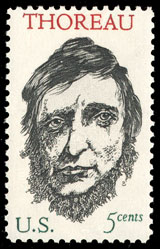Henry David Thoreau
Henry David Thoreau (July 12, 1817 – May 6, 1862) was an American essayist, poet, and philosopher. A leading transcendentalist, Thoreau is best known for his book Walden, a reflection upon simple living in natural surroundings, and his essay Civil Disobedience, an argument for disobedience to an unjust state.
Early Life[edit | edit source]
Henry David Thoreau was born in Concord, Massachusetts, to John Thoreau and Cynthia Dunbar. He was educated at Harvard University, where he studied classics and philosophy. After graduating in 1837, Thoreau struggled to find his place in the world. He worked at a family pencil factory and briefly taught school before turning to writing and philosophy.
Walden[edit | edit source]
In 1845, Thoreau began his experiment in simple living on the shores of Walden Pond in Concord. He built a small cabin and lived there for two years, two months, and two days, a period during which he sought to reduce his needs to the essentials and learn to live self-sufficiently. The experience formed the basis of Walden, published in 1854, which espouses the virtues of simplicity, self-reliance, and closeness to nature.
Civil Disobedience[edit | edit source]
Thoreau's essay Civil Disobedience, originally titled Resistance to Civil Government, was inspired by his 1846 imprisonment for refusing to pay a poll tax that supported the Mexican–American War and slavery. In it, Thoreau argues that individuals should not permit governments to overrule their consciences and that they have a duty to avoid allowing their acquiescence to enable the government to make them the agents of injustice.
Later Life and Death[edit | edit source]
Thoreau's later years were marked by his deepening engagement with natural history and his contributions to the abolitionist movement. He delivered lectures that were later published, such as Slavery in Massachusetts and A Plea for Captain John Brown. Thoreau died of tuberculosis in 1862, at the age of 44, in Concord.
Legacy[edit | edit source]
Thoreau's work has had a lasting impact on American thought and literature. His advocacy for living a life of simplicity and his belief in the sanctity of the individual's conscience have inspired countless readers and influenced leaders such as Mahatma Gandhi and Martin Luther King Jr.. Thoreau's writings on natural history and science underscore his belief in the interconnectedness of all life and have anticipated modern ecological and environmental thinking.
Search WikiMD
Ad.Tired of being Overweight? Try W8MD's NYC physician weight loss.
Semaglutide (Ozempic / Wegovy and Tirzepatide (Mounjaro / Zepbound) available. Call 718 946 5500.
Advertise on WikiMD
|
WikiMD's Wellness Encyclopedia |
| Let Food Be Thy Medicine Medicine Thy Food - Hippocrates |
Translate this page: - East Asian
中文,
日本,
한국어,
South Asian
हिन्दी,
தமிழ்,
తెలుగు,
Urdu,
ಕನ್ನಡ,
Southeast Asian
Indonesian,
Vietnamese,
Thai,
မြန်မာဘာသာ,
বাংলা
European
español,
Deutsch,
français,
Greek,
português do Brasil,
polski,
română,
русский,
Nederlands,
norsk,
svenska,
suomi,
Italian
Middle Eastern & African
عربى,
Turkish,
Persian,
Hebrew,
Afrikaans,
isiZulu,
Kiswahili,
Other
Bulgarian,
Hungarian,
Czech,
Swedish,
മലയാളം,
मराठी,
ਪੰਜਾਬੀ,
ગુજરાતી,
Portuguese,
Ukrainian
Medical Disclaimer: WikiMD is not a substitute for professional medical advice. The information on WikiMD is provided as an information resource only, may be incorrect, outdated or misleading, and is not to be used or relied on for any diagnostic or treatment purposes. Please consult your health care provider before making any healthcare decisions or for guidance about a specific medical condition. WikiMD expressly disclaims responsibility, and shall have no liability, for any damages, loss, injury, or liability whatsoever suffered as a result of your reliance on the information contained in this site. By visiting this site you agree to the foregoing terms and conditions, which may from time to time be changed or supplemented by WikiMD. If you do not agree to the foregoing terms and conditions, you should not enter or use this site. See full disclaimer.
Credits:Most images are courtesy of Wikimedia commons, and templates, categories Wikipedia, licensed under CC BY SA or similar.
Contributors: Prab R. Tumpati, MD





